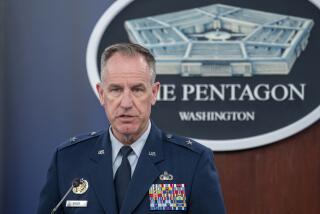Nations Slow to Ban Chemical Weapons
- Share via
WASHINGTON — Despite outrage and fear over Iraq’s past use of poison gas and its threats about the future, the world community continues to inch along toward a global ban on chemical weapons.
Although the Soviet Union and the United States have made major strides toward elimination of their chemical weapons stockpiles, a 40-nation disarmament conference is taking only baby steps toward the same goal.
Despite the threat posed by Iraqi President Saddam Hussein to unleash chemical warfare if his nation is attacked, negotiators in Geneva probably will take years to reach agreement on a treaty to ban the manufacture, storage, possession or use of such weapons.
To be sure, there is a 1925 protocol--signed by Iraq, as well as most of the leading nations of the world--that forbids the use of poison gas. The only consequences of a violation, however, are possible retaliation by an adversary and public condemnation.
The latest round of bargaining is expected to end soon without making significant progress. And a solution does not appear to be in sight during 1991, either.
Even if a new, more comprehensive treaty came into effect, it would bind only those nations that agree to accept its provisions. Defiant states, like Iraq and Libya--which are both observers at the current Geneva talks--might refuse to sign and could ignore any public outcry on the issue.
The difficulties of negotiating a treaty have proved so vexing that the U.N. Disarmament Conference has been frustrated for 22 years in trying to reach agreement in this area.
Disarmament specialists said that the issues are extremely complex and difficult since some of the chemicals used for weapons also are needed for peaceful purposes, such as firefighting or use as pesticides. Without safeguards, trade secrets of chemical companies might be exposed. And unlike nuclear weapons, which require special production facilities that cannot be easily hidden, poison gas can be made clandestinely in almost any factory.
Without the right of international monitors to stage lightning-like inspections that offend the traditional notion of national sovereignty, therefore, cheating could be almost impossible to detect.
Revulsion over poison gas crested during World War I, when it caused 1.3 million casualties and almost 100,000 deaths. Later, Italy employed gas against Abyssinia in 1935, and Japan used the weapon against China in 1938.
More recently, an estimated 200 civilians died during the Iran-Iraq War when both sides resorted to chemical weapons in their protracted struggle. Hussein’s army also used nerve gas against Kurdish rebels, killing more than 100 and causing about 65,000 others to flee the country.
This prompted senior officials from 149 governments, meeting in Paris early in 1989, to pledge renewed efforts for a total ban on the manufacture, stockpiling or use of such weapons.
“A major push was necessary to avoid chemical weapons becoming part of the poor man’s nuclear arsenal,” explained one participant.
But the talks drifted along with only minor progress. Then, at the U.S.-Soviet summit meeting last spring, President Bush and Soviet President Mikhail S. Gorbachev agreed to cut their chemical weapons stockpiles by 80%.
In the first eight years after a global ban was achieved, the United States and the Soviet Union promised to reduce their chemical weapons’ arsenals by another 8%. The remaining U.S. and Soviet stockpiles would be held until all 20 countries capable of producing such weapons have signed a treaty agreeing to the ban.
Despite the impetus from the Bush-Gorbachev summit accord, however, the pace of the Geneva talks has not speeded up.
“The negotiations are making what I call slow progress,” said one U.S. official familiar with the chemical weapons discussions. “But the summit agreement tells the world: ‘If the two big guys can do it, you all can do it, too.’ ”
More to Read
Sign up for Essential California
The most important California stories and recommendations in your inbox every morning.
You may occasionally receive promotional content from the Los Angeles Times.













